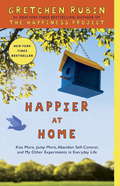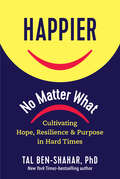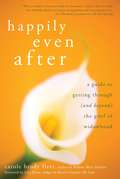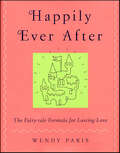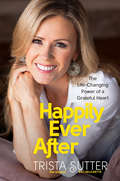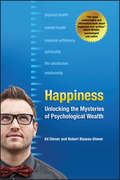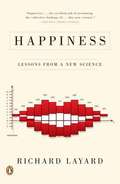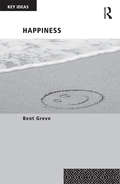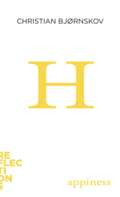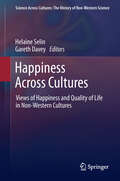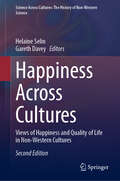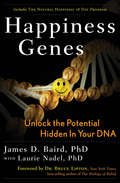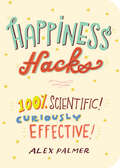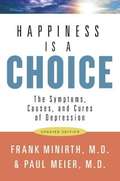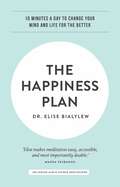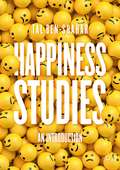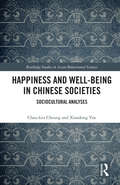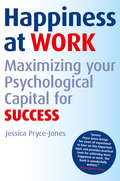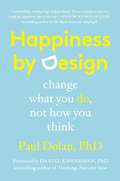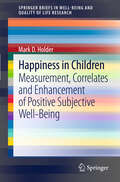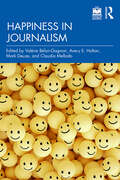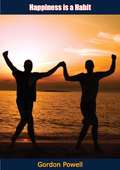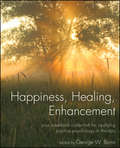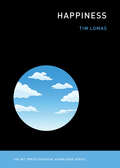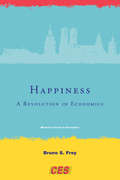- Table View
- List View
Happier at Home: Kiss More, Jump More, Abandon Self-control, And My Other Experiments In Everyday Life
by Gretchen RubinTolstoy wrote, "Happy families are all alike; every unhappy family is unhappy in its own way." This is the statement that inspired bestselling author Gretchen Rubin to wonder whether she could foster an even greater happiness in her home. During The Happiness Project, the same questions kept tugging at her. How can I raise happy children? How can I maintain a tender, romantic relationship with my spouse--after fifteen years of marriage? How do I keep my Blackberry from taking over my private life? How can I foster a well-ordered, light-hearted atmosphere in my house, when no one else will lift a finger to cooperate?This book is Gretchen's account of her second journey in pursuit of happiness. Prescriptive, easy-to-follow, and anecdotal, Happier at Home offers readers a way of thinking and being that is positive and life-affirming. With specific examples following the calendar year, an intimate voice, and drawing from science and pop culture, this book will resonate with anyone looking to strengthen the bonds of family.
Happier, No Matter What: Cultivating Hope, Resilience, And Purpose In Hard Times
by Tal Ben-ShaharEven when everything is going wrong, the science of happiness can help you! Pioneering positive psychologist and New York Times–bestselling author Tal Ben-Shahar shows us how in Happier, No Matter What. Ben-Shahar busts the all-too-common ideas that success brings happiness and that we can seek happiness itself. When hard times thwart our success and steal our joy, these ideas actually invite despair by leaving us with nothing to do. But we can do something: We can climb the SPIRE—Ben-Shahar’s five-step staircase to hope and purpose. Spiritual: I am experiencing meaning. Physical: My body’s needs are met. Intellectual: I am learning. Relational: My friends support me. Emotional: I am allowed to feel. By truly living these five elements of well-being, we build the resilience to carry us through anything—from a personal loss to a global pandemic. Ben-Shahar’s all-new SPIRE method shows us the way to becoming “whole again”—and when we’re whole, we invite happiness in.
Happily Even After
by Carole Brody Fleet Lisa KlineThe issues that surround the loss of a spouse are numerous and complex. A very small sampling of these issues include helping children cope with a parent's death, re-entering the workplace and eventually re-entering the world of dating, love and intimacy; as well as moving through a profoundly emotional period. The widowed must find a way to accept and deal with these oftentimes conflicting and confusing emotions while being expected to "carry on and carry forward" by those around them. The widowed must also adjust financially and legally; as well as be available to children that inevitably look to their surviving parent for guidance and support. Whether newly widowed or widowed for many years, those who has suffered the loss of a spouse have many questions that need answering and they likely know no one who is adequately qualified to answer those questions. Award-winning author and grief recovery expert, Carole Brody Fleet follows up the critically acclaimed: "Widows Wear Stilettos" with the aptly-titled, Happily Even After, the first and only book of its kind; answering the most common questions that the widowed generally have both immediately following a spouse's death as well as months and even years thereafter. These questions are excerpted from thousands of actual letters received by the author and the responses are from the author's own perspective; based upon considerable personal and professional experience and insight. Since the questions featured are the more commonly asked questions by those who are themselves widowed, readers will likely find answers to most of the questions that they have concerning widowhood; dealing with everything from child rearing as a widowed parent to coping with relatives who fancy themselves financial wizards, to the "rules of intimacy"...and a wide-ranging variety of subjects in between. In her warm, witty and wise tone, Carole walks widows through the shock and overwhelming sadness and back into the land of the living. Whether you are a young woman in the early years of a marriage, a Golden Anniversary celebrant or a "widow of the heart" who lost a signifigant other with no legal claims, Fleet will hold your hand and offer you practical tools for any problem you may face. Most importantly, Happily EVEN After will help you reclaim YOU.
Happily Ever After: The Fairy-tale Formula for Lasting Love
by Wendy ParisFind Your Inner Princess and Live Happily Ever AfterDon't let anyone tell you true love is a fairy tale. You can find the romance of your dreams, and this book will tell you how.In Happily Ever After, author Wendy Paris offers a contemporary spin on ten classic fairy tales, going behind the scenes with these legendary romantic heroines to show what they did to live happily ever after. Contrary to popular belief, fairy-tale heroines are not weak and passive. They are noble, brave, optimistic women who know that the formula for success in a chaotic world is to hold fast to their own beliefs despite what fate happens to throw their way. Ultimately, it is their character that saves them, not the prince on the white horse.Take Cinderella, for example. Despite having a less than ideal job, she didn't let bitterness and regret give her an ulcer, bad skin, and frown wrinkles. She knew "cinder maid" was a job title, not a life description.She didn't hide in her carriage, crying, "I can't go to the ball by myself! Everyone will think I'm a loser! " She had the courage to attend a party alone.At the stroke of midnight, she didn't cling to the prince's hand and wail, "Save me from my miserable life!" She had the confidence to know that if he liked her, he'd come calling.This humorous, heartfelt book shows women how to focus on their strengths and character rather than resort to manipulative strategies to "land" a man. The perfect antidote to negative dating guides that just don't work, Happily Ever After offers practical, empowering advice that's been proven effective for the last 500 years and is still relevant today.
Happily Ever After: The Life-Changing Power of a Grateful Heart
by Trista SutterTrista Rehn was a pediatric physical therapist moonlighting as a Miami Heat dancer when she heard about casting for a new reality show-one guy getting to know twenty-five girls in the hope of finding a fiancée. As improbable and crazy as it sounded, Trista took the chance-and had her heart broken on the very first season of The Bachelor. But the next season, as the first Bachelorette, her fairy tale fell into place during a whirlwind courtship with poetry-writing firefighter Ryan Sutter and, eventually, a dream-come-true wedding on national TV. In the midst of building a life with Ryan and raising two kids, Trista started to make a conscious effort to remember her favorite part of each day. And she’s made sure to post these thoughts, her own personal expressions of gratitude, almost every night on Twitter and Facebook-even on days she was dealing with fertility issues, a difficult pregnancy, family deaths, and other challenges that many of us face. Sometimes it’s the smallest gestures and the most unassuming things that can have the greatest effects. Trista is often asked her secret to being one of the rare reality-TV relationships to make it to the altar and beyond. In this heartfelt book, she shares the simple yet profound keys to finding everyday happiness: gratitude and grace. From the blink-and-you’ll-miss-them moments we have with our kids, our spouses, our pets, or even strangers, to the more obvious lessons we pick up from reading the news or hearing an inspirational story, knowing how to recognize, accept, and be grateful for all of our daily blessings is truly what "happily ever after” means.
Happiness
by Robert Biswas-Diener Ed DienerUtilizing sophisticated methodology and three decades of research by the world's leading expert on happiness, Happiness challenges the present thinking of the causes and consequences of happiness and redefines our modern notions of happiness. shares the results of three decades of research on our notions of happinesscovers the most important advances in our understanding of happinessoffers readers unparalleled access to the world's leading experts on happinessprovides "real world" examples that will resonate with general readers as well as scholarsWinner of the 2008 PSP Prose Award for Excellence in Psychology, Professional and Scholarly Publishing Division of the Association of American Publishers
Happiness
by Richard LayardThere is a paradox at the heart of our lives. We all want more money, but as societies become richer, they do not become happier. This is not speculation: It's the story told by countless pieces of scientific research. We now have sophisticated ways of measuring how happy people are, and all the evidence shows that on average people have grown no happier in the last fifty years, even as average incomes have more than doubled. The central question the great economist Richard Layard asks in Happiness is this: If we really wanted to be happier, what would we do differently? First we'd have to see clearly what conditions generate happiness and then bend all our efforts toward producing them. That is what this book is about-the causes of happiness and the means we have to effect it. Until recently there was too little evidence to give a good answer to this essential question, but, Layard shows us, thanks to the integrated insights of psychology, sociology, applied economics, and other fields, we can now reach some firm conclusions, conclusions that will surprise you. Happiness is an illuminating road map, grounded in hard research, to a better, happier life for us all. .
Happiness (Key Ideas)
by Bent GreveAlthough happiness is based upon individuals’ subjective perception of their own situation, understanding the concept of happiness is important for forming policies in modern societies. Taking into account discussions from disciplines across the social sciences, this book explores varying notions of happiness and how these are applied to create a theoretical understanding of the concept. The book then goes on to demonstrate how a general theoretical concept of happiness can be used to add to our knowledge of central aspects of modern society, ranging from questions related to welfare state analysis, through to evaluating everyday life for individual people. In doing so, Happiness presents an up-to-date and applied account of how happiness is now widely used in economics, sociology, psychology and political science, whilst also exploring the relationship between happiness and public policy.
Happiness (Reflections)
by Christian BjørnskovA short but engaging look at how the key to our own happiness may lie with other people.Why is Denmark consistently ranked one of the happiest nations? In Happiness, researcher Christian Bjørnskov explores what we mean when we talk about happiness. Based on new research findings on how people perceive their own lives, Bjørnskov argues that the basic factors that constitute happiness are mostly universal across cultures. By evaluating studies and theories on happiness that test how family, genetics, religion, wealth, work, and trust factor into our happiness as well as how often we smile or compare ourselves to others, Bjørnskov outlines why our most important source of happiness may be the people around us. ReflectionsIn Reflections, a series copublished with Denmark's Aarhus University Press, scholars deliver 60-page reflections on a key concept that encapsulates their years of study and research. These books present unique insights on a wide range of topics and concepts—everything from love, trust, and play, to corruption, welfare, and sleep—that entertain and enlighten readers with exciting discoveries and new perspectives.
Happiness Across Cultures
by Helaine Selin Gareth DaveyDifferent cultures experience happiness differently. Traditionally, the West is considered materialistic, and happiness is said to come from achievement and acquisition. The East is said to be more people-oriented, where happiness is a result of deep personal interactions. Thus, poor people can be happier in the East than the West, because they are not so concerned with possession and more with society. This book considers happiness and quality of life in non-Western countries and cultures. Its coverage is diverse and spans the breadth of the non-Western world, revealing unique perspectives of happiness and life quality embedded in rich cultural traditions and histories.
Happiness Across Cultures: Views of Happiness and Quality of Life in Non-Western Cultures (Science Across Cultures: The History of Non-Western Science #6)
by Helaine Selin Gareth DaveyThis second edition of Happiness Across Cultures contains 8 brand new chapters on previously uncovered topics, such as Covid19, refugees, and violence. Different cultures experience happiness differently. Traditionally, the West is considered materialistic, and happiness is said to come from achievement and acquisition. The East is said to be more people-oriented, where happiness is a result of deep personal interactions. Thus, poor people can be happier in the East than the West, because they are not so concerned with possession and more with society. This new edition considers happiness and quality of life in non-Western countries and cultures. Its coverage is now more diverse and spans the breadth of the non-Western world, revealing unique perspectives of happiness and life quality embedded in rich cultural traditions and histories.
Happiness Genes: Unlock the Positive Potential Hidden in Your DNA
by Laurie Nadel James D. BairdHow the science of epigenetics reveals that we&’re wired for natural happiness—includes a 28-day plan to create a biological cascade of well-being. Happiness Genes explores the surprising link between science and spirituality—and makes it clear that happiness can&’t be bought. It&’s actually at our fingertips—or more precisely, in our DNA. The new science of epigenetics reveals that there are reserves of natural happiness within your DNA that can be controlled by you—your emotions, beliefs, and behavioral choices. This book examines the nature and source of happiness, from ancient times to the present. It presents the epigenetic and other biological research that shows that DNA contains genes for natural happiness and your ultimate well-being. Then it details the 28-Day natural happiness program—to show you how to switch on your own happiness genes.
Happiness Hacks: 100% Scientific! Curiously Effective!
by Alex PalmerHighly Effective Hacks From Totally True Facts! Could you be happier at work . . . in love . . . in life? You may not need a total overhaul—just a few good Happiness Hacks! Here are hundreds of shortcuts to brighten your day and boost your mood—and the science behind how they work. Discover why . . . 57°F (13.9°C) is the happiest temperature Selfies give you a jolt of joy Renters have a surprising edge over homeowners 17-minute breaks are the most productive Intimacy is better than sex It’s more satisfying to work a full 40-hour week Date night is the key to a happy marriage Just 10 minutes of exercise can cheer you up! Whether you’re seeking better health, stronger friendships, or that elusive “happy place,” these stunningly simple tips are proven to help. You can hack your way to happiness!
Happiness Is a Choice: The Symptoms, Causes, and Cures of Depression
by Frank Minirth Paul MeierWhether depression is felt mildly or acutely, temporarily or persistently, it strikes nearly everyone. Drs. Minirth and Meier believe, however, that the emotional pain of depression can be overcome or altogether avoided. Happiness Is a Choice explores the complex relationship between spiritual life and psychological health and then spell out basic steps for recovering from depression and maintaining a happy, fulfilling life.
Happiness Plan
by Elise BialylewWhat if you could train your brain to experience greater happiness, focus, and emotional balance in daily life? What if it took just ten minutes a day?In The Happiness Plan, Dr Elise Bialylew offers a roadmap to a happier life. Drawing on her background in medicine, psychiatry and mindfulness meditation, she has created a powerful one-month mindfulness program that will lead you to a more balanced and fulfilled existence.In this transformative guidebook you'll discover simple practices to:Increase your sense of wellbeing, balance and joyReduce stress and worry (and its negative impact on your body)Improve your focus, performance and fulfilment at workCreate more fulfilling relationshipsIncrease your sense of purpose, connection and meaning in life.Featuring access to guided audio meditations, daily mindfulness exercises, fascinating scientific insights and recipes to inspire mindful eating, The Happiness Plan has the power to transform your mind, and your life.
Happiness Studies: An Introduction
by Tal Ben-ShaharIn this book, Tal Ben-Shahar introduces a new interdisciplinary field of study that is dedicated to exploring happiness. The study of happiness ought not be left to psychologists alone. Philosophers, theologians, biologists, economists, and scholars from other disciplines have explored ways of attaining happiness, and to do justice to this important pursuit, we ought to listen to their words and experiment with their prescriptions. Not only does the field of happiness studies embrace different disciplines, it also approaches happiness as a multifaceted and multidimensional variable that includes five parts which form the acronym SPIRE:Spiritual wellbeingPhysical wellbeingIntellectual wellbeingRelational wellbeingEmotional wellbeing This book addresses each of these elements of happiness, explains them, and addresses practical ways for their cultivation.
Happiness and Well-Being in Chinese Societies: Sociocultural Analyses (Routledge Studies in Asian Behavioural Sciences)
by Xiaodong Yue Chau-kiu CheungThis book addresses the sustainability of happiness and well-being in Chinese societies. It starts by introducing the various conceptions of well-being, particularly in the Chinese sociocultural context. The book then proceeds with the examination of the sustainability of well-being by scrutinizing the effects of sociocultural, contextual, and personal factors on well-being. The contextual factors are the aggregates or averages of personal factors at the contextual levels of the regions and colleges in Mainland China, its special administrative region, and Taiwan. These factors cover personality traits, strengths, orientations, beliefs, values, and idolizing. By bringing together empirical studies and theoretical perspectives applied to Chinese societies, this book offers researchers in social science and humanities a valuable reference work on happiness and well-being in Chinese societies.
Happiness at Work
by Jessica Pryce-JonesSharing the results of her four-year research journey in simple, jargon-free language, Pryce-Jones exposes the secrets of being happy at work.Focuses on what happiness really means in a work context and why it matters to individuals and organisations in both human and financial termsEquips readers with the information, knowledge and skills to make the most of the nearly 100,000 hours that they'll spend at work over a lifetimeDemystifies psychological research through a fascinating array of anecdotes, case studies, and interviews from people in the trenches of the working world, including business world-leaders, politicians, particle physicists, and philosophers, sheep farmers, waitresses, journalists, teachers, and lawyers, to name just a few
Happiness by Design
by Daniel Kahneman Paul DolanThis is not just another happiness book. In Happiness by Design, happiness and behavior expert Paul Dolan combines the latest insights from economics and psychology to illustrate that in order to be happy we must behave happy Our happiness is experiences of both pleasure and purpose over time and it depends on what we actually pay attention to. Using what Dolan calls deciding, designing, and doing, we can overcome the biases that make us miserable and redesign our environments to make it easier to experience happiness, fulfilment, and even health. With uncanny wit and keen perception, Dolan reveals what we can do to find our unique optimal balance of pleasure and purpose, offering practical advice on how to organize our lives in happiness-promoting ways and fresh insights into how we feel, including why: * Having kids reduces pleasure but gives us a massive dose of purpose * Gaining weight won't necessarily make us unhappier, but being too ambitious might * A quiet neighborhood is more important than a big house Vividly rendering intriguing research and lively anecdotal evidence, Happiness by Design offers an absorbing, thought-provoking, new paradigm for readers of Stumbling on Happiness and The How of Happiness.
Happiness in Children
by Mark D. HolderThis briefs summarizes the research on positive well-being in children, with a particular focus on their happiness. It starts with a discussion of the constructs of positive psychology (i.e., well-being, happiness and life satisfaction), and then outlines the research that shows the importance of studying well-being. Next, it explores how researchers measure happiness and what these measures tell us about whether children are happy and how their happiness differs from adults. Following this, it discusses current positive psychology theories with the aim of suggesting their promise in understanding children's well-being. Next, it examines the importance of individual differences, including culture and temperament. Because studies have only recently identified several of the factors associated with children's happiness, the book ends with a discussion of how we might enhance children's well-being and suggests directions for future research.
Happiness in Journalism
by Mark Deuze Claudia Mellado Valérie Bélair-Gagnon Avery E. HoltonThis book examines how journalism can overcome harmful institutional issues such as work-related trauma and precarity, focusing specifically on questions of what happiness in journalism means, and how one can be successful and happy on the job. Acknowledging profound variations across people, genres of journalism, countries, types of news organizations, and methodologies, this book brings together an array of international perspectives from academia and practice. It suggests that there is much that can be done to improve journalists’ subjective well-being, despite there being no one-size-fits-all solution. It advocates for a shift in mindset as much in theoretical as in methodological approaches, moving away from a focus on platforms and adaptation to pay real attention to the human beings at the center of the industry. That shift in mindset and approach involves exploring what happiness is, how happiness manifests in journalism and media industries, and what future we can imagine that would be better for the profession. Happiness is conceptualized from both psychological and philosophical perspectives. Issues such as trauma, harassment, inequality, digital security, and mental health are considered alongside those such as precarity, recruitment, emotional literacy, intelligence, resilience, and self-efficacy. Authors point to norms, values and ethics in their regions and suggest best practices based on their experience. Constituting a first-of-its-kind study and guide, Happiness in Journalism is recommended reading for journalists, educators, and advanced students interested in topics relating to journalists’ mental health and emotion, media management, and workplace well-being. This book is accompanied by an online platform which supports videos, exercises, reports and links to useful further reading.
Happiness is a Habit
by Gordon PowellThe most dominating goal of the average person today is to find happiness.Clergymen, doctors, sociologists and specialists in human nature will generally agree that the above statement accurately reflects the times. A famous author-minister—Gordon Powell—has written an inspirational book based on the above statement.Gordon Powell was minister of St. Stephen’s Presbyterian Church in Sydney, Australia. One unique aspect of this church was the lunch-hour service every Wednesday for professional and business people. This service was broadcast by eighteen radio stations, in four states of the continent, to an area covering ninety per cent of the population. It was also shown on television in the areas of Sydney, Melbourne and Adelaide. St. Stephen’s claimed the largest attendance of any Protestant church in Australia.Another spiritually creative feature of Gordon Powell’s ministry is the “Faith Builder” cards, over a million of which have been printed and distributed. The cards contain both a scriptural guide for living, plus a modern interpretation or adaptation of the Biblical wisdom. Each of the twelve chapters in Happiness Is A Habit ends with a “Faith Builder,” and these “Faith Builders” are printed again in a separate section at the end of the book in case you should want to clip them out for personal use.Happiness is a Habit digs into the heart of today’s complexities, offering helpful guidance and spiritual nourishment to the reader.“A sensible philosophy of life, based on the teaching of the Sermon on the Mount, and teaching that the secret of happiness lies in right thinking and in the application of a positive faith to everyday life.”—The Times Literary Supplement
Happiness, Healing, Enhancement
by Burns George W.Praise for Happiness, Healing, Enhancement "Filled with good strategies based in research, compelling case material, and most importantly, practical advice, this book belongs in the library of everyone interested in what it means to live well. It provides not only ample food for thought, but for action. " -Christopher Peterson, Professor of Psychology, University of Michigan "If you are a therapist, a coach-or if you want to help yourself and others flourish-then this book is a must-read. It is an important theoretical and practical contribution to the field of positive psychology-and, in fact, to the field of psychology as a whole. " -Tal Ben-Shahar, author of Happier and The Pursuit of Perfect A practical guide to applying the principles of positive psychology in your mental health practice Edited by internationally recognized psychologist, author, and therapist trainer George Burns, Happiness, Healing, Enhancement: Your Casebook Collection for Applying Positive Psychology in Therapy provides thought-provoking yet realistic and practical contributions from practitioners of positive psychology from around the world who share how they have translated solid, positive psychology research into sound clinical practice. Organized to make searching for a particular diagnostic category or therapeutic outcome fast and easy, this guide features: Contributions from some of the world's foremost positive psychology clinicians, researchers, and teachers, including P. Alex Linley, Betty Alice Erickson, Robert Weis, Antonella Delle Fave, Richard G. Tedeschi, Robert Biswas-Diener, Michael D. Yapko, and Bill O'Hanlon Examples and strategies including a "Putting It into Practice" feature that illustrates how readers can immediately apply the therapeutic applications covered in each chapter Building on the proven benefits of the positive psychology movement, Happiness, Healing, Enhancement will teach you new skills that will strengthen your practice of therapy and equip your clients with the pathways to overcome challenging problems and live a full, satisfying life.
Happiness: A Cross-cultural Lexicon Of Well-being (The MIT Press Essential Knowledge series)
by Tim LomasA concise and engaging exploration of how we understand happiness.What does it mean to feel happiness? As a state of mind, it&’s elusive. As a concept—despite the plethora of pop psychology books on the subject—it&’s poorly understood. In this volume in the MIT Press Essential Knowledge series, psychologist Tim Lomas offers a concise and engaging overview of our current understanding of happiness. Lomas explains that although the field of positive psychology, which focuses on happiness, emerged only in the last twenty-five years, interest in the meaning of happiness goes back several millennia. Drawing on a variety of disciplines, from philosophy and sociology to economics and anthropology, Lomas offers an expansive vision of what happiness means, exploring a significant range of experiential territory. After considering such related concepts as wellbeing and flourishing, Lomas traces ideas of happiness from the ancient Buddhist notions of sukha and nirvana through Aristotle&’s distinction between hedonic and eudaemonic happiness to today&’s therapeutic and scientific approaches. He discusses current academic perspectives, looking at the breadth of happiness research across disciplines; examines the mechanics of happiness—the physiological, psychological, phenomenological, and sociocultural processes that make up happiness; explores the factors that influence happiness, both individual and social; and discusses the cultivation of happiness.
Happiness: A Revolution in Economics (Munich Lectures in Economics)
by Bruno S. FreyA leading economist discusses the potential of happiness research (the quantification of well-being) to answer important questions that standard economics methods are unable to analyze.Revolutionary developments in economics are rare. The conservative bias of the field and its enshrined knowledge make it difficult to introduce new ideas not in line with received theory. Happiness research, however, has the potential to change economics substantially in the future. Its findings, which are gradually being taken into account in standard economics, can be considered revolutionary in three respects: the measurement of experienced utility using psychologists' tools for measuring subjective well-being; new insights into how human beings value goods and services and social conditions that include consideration of such non-material values as autonomy and social relations; and policy consequences of these new insights that suggest different ways for government to affect individual well-being. In Happiness, emphasizing empirical evidence rather than theoretical conjectures, Bruno Frey substantiates these three revolutionary claims for happiness research. After tracing the major developments of happiness research in economics and demonstrating that we have gained important new insights into how income, unemployment, inflation, and income demonstration affect well-being, Frey examines such wide-ranging topics as democracy and federalism, self-employment and volunteer work, marriage, terrorism, and watching television from the new perspective of happiness research. Turning to policy implications, Frey describes how government can provide the conditions for people to achieve well-being, arguing that a crucial role is played by adequate political institutions and decentralized decision making. Happiness demonstrates the achievements of the economic happiness revolution and points the way to future research.
